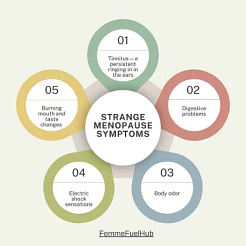Introduction to Lesser-Known Menopause Symptoms
Menopause is a natural phase in a woman’s life, but let me tell you—it can bring some surprises. Like most women, I was prepared for the usual hot flashes and night sweats, but no one told me about the other symptoms that might pop up. The lesser-known symptoms can catch you off guard. Understanding these unusual menopause symptoms is crucial for managing them effectively and improving the quality of life during this transition.
Why Some Menopause Symptoms Are Rarely Discussed
When it comes to menopause, society often focuses on the more common symptoms. It’s no wonder many of us feel blindsided by the rarer ones. I think part of the reason is that some symptoms feel too strange, embarrassing, or even unrelated at first glance. But by bringing these issues into the conversation, we can help more women feel seen and supported.
My Experience with Unusual Menopause Symptoms
One of the most surprising things I experienced was tinnitus—a persistent ringing in my ears that seemed to come out of nowhere. At first, I thought it was just stress or maybe too much time spent in noisy environments. But after some research, I learned that hormonal changes during menopause can affect the nervous system, leading to this unsettling sensation.
Another unexpected issue was digestive problems. For weeks, I dealt with unexplained bloating and nausea that made meals a chore. It wasn’t until I connected the dots to my fluctuating hormones that I started to understand what was happening.
And then there was the change in body odor. This one threw me for a loop. As estrogen levels drop, your body chemistry shifts, and suddenly, you’re dealing with smells you’ve never noticed before. It’s a small thing, but it can chip away at your confidence if you’re not prepared for it.
Unusual Physical Symptoms
Electric Shock Sensations and Their Connection to Hormonal Fluctuations
One unexpected physical symptom experienced during menopause is electric shock sensations. These felt like tiny jolts of electricity running through my body, usually right before a hot flash. The cause is primarily linked to fluctuations in hormone levels, particularly estrogen. Estrogen plays a crucial role in maintaining nervous system stability, and its decrease during menopause can lead to nerve endings firing erratically, resulting in these electric shock sensations.
Burning Mouth Syndrome and Taste Changes
Another lesser-known menopause symptom is burning mouth syndrome (BMS), characterized by a persistent burning sensation in my tongue and throat that makes eating and drinking uncomfortable. This condition can also be accompanied by changes in taste, like a metallic taste or a loss of taste altogether. Again, hormonal changes are blamed, especially a decline in estrogen, which can affect the salivary glands and taste buds, leading to BMS and altered taste sensations. It’s critical to recognize and address these uncommon menopause symptoms, as they can significantly impact daily life, including eating and speaking.
Itchy Skin and Formication (Crawling Sensations)
The sensation of bugs crawling under my skin, known as formication, was one I never expected, but it’s surprisingly common. A drop in estrogen, again, is the chief culprit, this time affecting collagen production and oil gland function, leading to dryness and itchiness. Skin hydration and care become essential during this time to mitigate discomfort.
Recognizing these uncommon symptoms is vital for managing menopause’s broader effects on the body. Women can seek appropriate treatments and support by understanding the physical manifestations linked to hormonal changes.
As we move forward, it’s important to acknowledge that menopause doesn’t just bring physical symptoms but also unexpected cognitive changes, which can significantly affect one’s daily functionalities and overall well-being.
Unexpected Cognitive Changes
Menopause doesn’t just affect your body; it impacts your mind, too. I noticed myself struggling with word recall and language processing. Sometimes, I’d find myself overwhelmed by smells that never used to bother me. These cognitive shifts can be disorienting, but knowing they’re linked to menopause can help ease the frustration.
Difficulty with Word Recall and Language Processing
One of the cognitive symptoms that can surprise women entering menopause is difficulty with word recall and language processing. This can manifest as frequently forgetting common words or names, struggling to articulate thoughts clearly, or even experiencing delays in verbal responses. These issues are primarily linked to the decline in estrogen levels, which affects neurotransmitter functions involved in memory and language. Such cognitive shifts can be frustrating, but understanding their root cause can ease concerns and encourage seeking practical coping strategies.
Changes in Spatial Awareness and Coordination
Another cognitive alteration to be aware of includes changes in spatial awareness and coordination. I have noticed that I have become clumsier, often bumping into objects or misjudging distances. These changes can be disorienting; however, they result from hormonal changes impacting the brain regions responsible for spatial awareness. Reduced estrogen levels can affect proprioception (the body’s ability to sense its position in space), thus influencing overall coordination. Staying mindful of these changes can help mitigate their impacts, enhancing safety and everyday functioning.
Increased Sensitivity to Smell
Menopause can also heighten sensitivity to smell, making previously mild odors appear overwhelming and previously neutral scents intolerable. This increased olfactory sensitivity is thought to be related to fluctuations in sex hormones, including estrogen and progesterone, which can affect sensory processing in the brain. Such changes can impact daily life, influencing food preferences or causing discomfort in certain environments. Adjusting to these changes by modifying exposure to strong smells can provide relief and improve overall quality of life.
These cognitive changes underline the extensive impact of menopause, reaching far beyond commonly known symptoms. Recognizing and understanding these shifts can aid in developing effective coping mechanisms and improving overall well-being.
Strange Emotional and Psychological Effects
Sudden Onset of Anxiety in Previously Calm Individuals
Emotionally, menopause brought its unexpected emotional shifts. Out of nowhere, I started feeling anxious about things that never used to bother me, overwhelmed, experiencing heart palpitations, and having trouble sleeping.
While these emotional swings were tough, they also became an opportunity for growth. Acknowledging them as part of the process allowed me to explore coping strategies, like mindfulness and journaling, that have since become invaluable tools.
Unexplained Rage or Anger Episodes
Another emotional symptom I have experienced often is the sudden emergence of rage or anger episodes. Some days, I’d experience bursts of anger or irritation that felt completely out of character. Even individuals who previously had mild tempers are reported to find themselves losing control over minor provocations. These intense emotional outbursts can be distressing and may strain personal and professional relationships.
The underlying cause is again linked to fluctuating hormone levels. Both estrogen and progesterone can influence the brain’s regulation of mood. As these hormone levels waver, the neurotransmitters and the brain’s ability to moderate emotions can become erratic, leading to these bouts of anger.
Shifts in Personal Identity and Self-Perception
Menopause can also provoke profound shifts in personal identity and self-perception. I had moments of deep introspection, questioning my identity and purpose in ways I hadn’t before. It is reported that as women experience a significant life change, they may start to question their roles, purpose, and sense of self. This introspective journey can manifest in various ways, from feeling less confident to reevaluating long-held beliefs and aspirations. I have particularly lost some confidence in driving.
Such shifts can be unsettling, yet they also offer an opportunity for personal growth and rediscovery. Recognizing this, it becomes crucial for individuals to seek supportive environments and professional counselling if needed. This can aid in navigating the emotional turbulence and embracing changes with resilience.
Understanding the emotional and psychological effects of menopause is essential for overall well-being. These shifts are part of a broader hormonal transition; exploring them with empathy and knowledge can make the journey smoother.
Transitioning from understanding emotional impacts, the next logical step is deciphering the root causes, particularly, how hormones play a pivotal role in these changes. Recognizing this connection can offer deeper insights into personalized management strategies.
Understanding the Hormonal Connection
How Estrogen Affects Multiple Body Systems Beyond Reproduction
What I’ve come to realize is that menopause doesn’t just affect your reproductive system. It’s a full-body event. Estrogen, a key hormone in the female body, is well-known for its role in reproductive health. However, it also impacts various other systems, which is why fluctuating levels during menopause can lead to wide-ranging symptoms. Estrogen receptors are found in many tissues, including the brain, skin, bones, and cardiovascular system. This broad presence means that declining estrogen levels during menopause can influence everything from cognitive functions to skin health.
- Brain: Estrogen plays a critical role in maintaining cognitive health, impacting verbal memory, language skills, and mood regulation.
-
Skin: It helps maintain skin elasticity and moisture. Reduced levels can lead to symptoms like dry, itchy skin and formication.
- Bones: Estrogen helps preserve bone density, which is why a drop can increase the risk of osteoporosis.
- Cardiovascular System: Estrogen aids in regulating cholesterol levels and maintaining the health of blood vessels, impacting overall heart health.
The Role of Other Hormones in Causing Unusual Menopause Symptoms
While estrogen is central, other hormones also contribute to the diverse symptom profile of menopause.
- Progesterone: As another primary reproductive hormone, its decline can lead to sleep disturbances and changes in mood.
- Testosterone: Although present in smaller amounts in women, a decrease in testosterone can affect libido and muscle mass.
- Cortisol: Increased stress can elevate cortisol levels, exacerbating symptoms like anxiety and memory lapses.
- Thyroxine and Triiodothyronine: Thyroid hormones can also fluctuate, contributing to weight gain, fatigue, and mood swings.
Why Symptoms Can Vary Greatly Between Individuals
Each woman experiences menopause differently due to a range of factors:
- Genetics: Genetic makeup significantly influences symptom severity and type.
- Health Status: Pre-existing health conditions, like thyroid disorders or autoimmune diseases, can exacerbate symptoms.
- Lifestyle: Diet, exercise, stress levels, and sleep patterns heavily affect how menopause symptoms manifest.
Understanding the intricate web of hormonal changes aids in better management of menopause. Recognizing that these symptoms are not just random but are deeply tied to our body’s hormonal balance can bring a sense of relief and clarity to those experiencing them. This awareness is crucial as it underlies the biological rationale for the wide range of symptoms women face during menopause.
The Importance of Recognizing Uncommon Menopause Symptoms
Acknowledging and recognizing these uncommon symptoms can greatly improve the quality of life for those experiencing menopause. Unusual symptoms like burning mouth syndrome, sudden anxiety, or unexplained rage can be distressing and may impact daily functioning. Recognizing these symptoms as part of menopause can prevent unnecessary worry and allow for more targeted and effective management.
Understanding and discussing these lesser-known symptoms openly can reduce the stigma and help individuals seek appropriate medical attention and support. This knowledge empowers menopausal women to navigate this transition better and maintain their overall well-being.
Read our other articles on memory lapses, skin changes during menopause, and bone health.
When to Seek Medical Attention
Distinguishing Between Normal and Concerning Symptoms
Menopause encompasses many symptoms, many of which are not typically alarming. However, knowing which symptoms are within the expected range and which ones require medical consultation is essential.
Uncommon menopause symptoms, like itchy skin or electric shock sensations, can be unsettling but are often typical variations due to hormonal changes. However, persistent or severe symptoms, especially when they significantly interfere with daily life, should be evaluated by a healthcare provider.
Red Flags that Warrant Immediate Medical Attention
Certain symptoms during menopause may indicate more severe health issues unrelated to normal hormonal fluctuations:
- Unexplained Weight Loss or Gain – Significant and unexplained weight changes could indicate thyroid problems or other metabolic disorders.
- Severe Headaches – New or worsening headaches, especially when paired with visual disturbances or other neurological symptoms, may need immediate evaluation.
- Persistent or Unusual Pain – Chronic pain not corresponding to common menopausal symptoms could signal underlying conditions, such as cardiovascular disease or cancer.
- Heavy or Irregular Bleeding – Any postmenopausal bleeding or significantly irregular menstrual cycles should be promptly assessed to rule out endometrial hyperplasia or other serious issues.
- Severe Mood Swings or Depression – While mood changes can be hormone-related, profound depression or anxiety that affects functioning necessitates professional help.
How to Track and Report Unusual Menopause Symptoms to Healthcare Providers
Maintaining a detailed log of symptoms can be incredibly helpful when consulting with a healthcare provider. This log should include:
- Dates and Times: Note when symptoms occur to identify any patterns.
- Severity: Rate symptoms on a scale (e.g., 1-10) to convey their impact accurately.
- Triggers: Document possible triggers, even if they seem unrelated, to help identify correlations.
- Duration: Observe and record how long symptoms last.
- Associated Factors: Include any new medications, dietary changes, or lifestyle modifications that coincide with symptom onset.
When preparing for a medical appointment, bring a comprehensive list of symptoms and questions. This allows your healthcare provider to discern whether your experiences are within the normative range of menopause or if further investigation is necessary. This proactive approach enables appropriate treatments and better overall management of menopausal changes.
Understanding when to seek medical care and how to communicate symptoms effectively is critical in navigating menopause. With the right knowledge and support, women can ensure that their health needs are met efficiently and compassionately.
Managing Unusual Menopause Symptoms
Alternative and Complementary Treatment Options
With time, I discovered a combination of strategies that worked for me. Alternative and complementary treatments like acupuncture helped with my hot flashes and mood swings, while yoga, meditation, and tai chi became a cornerstone of my self-care routine.
Herbal supplements, such as black cohosh and evening primrose oil, can also help mitigate symptoms, though it’s essential to consult with a healthcare provider before starting any new supplement to ensure they don’t interact with other medications.
Lifestyle Modifications That Can Help
Navigating menopause’s lesser-known symptoms can be challenging, especially when traditional treatments don’t provide relief. Over time, I found that acknowledging and recognizing these symptoms greatly improved the quality of my life. Recognizing these symptoms as part of menopause prevented me from unnecessary worry and allowed for more targeted and effective management.
Adopting certain lifestyle changes can significantly alleviate unusual menopause symptoms. Regular exercise is beneficial not only for physical health but also for mental well-being. Activities like walking, swimming, or cycling can enhance mood, improve sleep, and reduce anxiety. Eating a balanced diet with plenty of fruits, vegetables, and phytoestrogen-rich foods like soy, flax seeds, and legumes also made a noticeable difference.
Staying hydrated and limiting caffeine and alcohol intake can also help manage symptoms. Simple practices such as wearing breathable fabrics, using moisturizers for itchy skin, and maintaining good oral hygiene can mitigate specific physical symptoms.
To learn more about lifestyle changes, please read our articles on wholesome eating, exercise, and tips on better sleep.
The Importance of Support Networks and Understanding
Support networks play a critical role during menopause. Connecting with family, friends, or support groups helps individuals feel understood and less isolated. Sharing experiences and coping strategies can be incredibly empowering. Healthcare providers should also be part of this support network, offering guidance and monitoring symptoms.
It’s essential to foster an environment of understanding and empathy at home and in the workplace. Educating those around you about menopause and its symptoms can lead to a more supportive and accommodating atmosphere, easing the transition during this phase of life.
Recognizing and managing unusual menopause symptoms early can lead to better outcomes and improved quality of life.
Embracing the Journey
Menopause is a challenging but transformative time. By acknowledging the unusual menopause symptoms, we can take steps to manage them and reclaim our well-being. If you’re going through this, know that you’re not alone. Together, we can break the silence around these lesser-known signs and navigate this life stage with resilience and grace.
This website may contain affiliate links, and we may earn a commission for any purchases you make on affiliate websites using these links. Our affiliates include Amazon and Click Bank. We only recommend products we have personally used. Rest assured, these affiliate links come at no additional cost to you.


